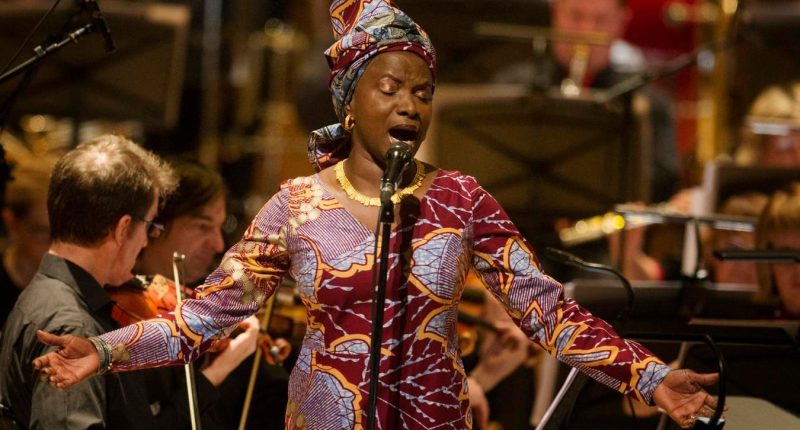Share this @internewscast.com
GLASGOW, UNITED KINGDOM – JANUARY 17: Angelique Kidjo performs on stage at Celtic Connections … More
Redferns via Getty Images
The African diaspora and admirers of the cultural potency that stems from the socioculture are celebrating the latest accolade granted unto legendary Afroworld fusion artist, Angélique Kidjo.
On Wednesday, July 2, the Hollywood Chamber of Commerce held a live press conference with Hollywood Chamber of Commerce President Steven Nissen and actor Eugenio Derbez and radio personality Richard Blade, also Walk of Famers, announcing the honorees encompassing the 2026 Class of Walk of Famers.
Blade announced Kidjo’s honor which deemed her as Africa’s “premiere diva,” which is moreover alluding to her Mama Africa aesthetic. Kidjo’s coming into the Hollywood Walk of Fame Class of 2026 stands as a historic moment, making Kidjo the first African artist to receive a star on the acclaimed California cement.
Kidjo is receiving the honor as part of the Recording category where she joins the legendary gospel group The Clark Sisters, iconic hip-hop Cleveland collective Bone Thugs-N-Harmony, Afro Brazilian percussionist Paulinho da Costa, Miley Cyrus, Zapata Mexican band Grupo Intocable, legendary Australian soft-rock Air Supply, Josh Groban, and Grammy award winning country artist and actor Lyle Lovett.
Angélique Kidjo’s four-decade career has been marked by an unapologetic grace and global acclaim, with her 2025 Grammy nomination standing as a testament to the enduring success of authentic African artistry in the professional music world.
During our exclusive interview at Carnegie Hall last year, Kidjo reflected on her remarkable journey and shared, “Music gave me the strength to talk about anything. My music is steeped in the story of resilience, love, and what you can accomplish with very little.” Her words resonated deeply, encapsulating the essence of her four-decade-long career that has seamlessly blended African traditions with global influences.
NEW YORK, NY – August 12: MANDATORY CREDIT Bill Tompkins/Getty Images Angélique Kidjo performing on … More
Getty Images
With roots in Benin through her Nigerian mother and Beninese father, Kidjo’s impact transcends her celebrated music and distinctive Mama Africa persona. She has become a bridge between generations, uplifting rising and seasoned African artists alike.
Over the course of her remarkable 40-year career, Kidjo has earned 15 Grammy nominations, securing six wins along the way. In 1995, she received her first Grammy nomination for “Agolo,” which was recognized in the Best Music Video category. The visual is heralded for its vibrant celebration of Benin culture featuring showcases of Fá deities, costumes adorned with ileke beads, Yoruba-style gele headwraps, and mesmerizing dance routines inspired by the Fon cultural dance, Zinli.
The “Wombo Lombo” songstress swiftly solidified her place on the music globe with subsequent nods for her sixth album Oremi in 1999 and following album, Black Ivory Soul, her 7th in 2003. Her first Grammy win came in 2007 for Best Contemporary World Music Album with Djin Djin, her ninth studio release. The album featured a groundbreaking fusion of African rhythms and Western influences, exemplified by her collaboration with Alicia Keys on the title track.
She went on to win Best World Music Album for Eve in 2014, Sings in 2015, and Celia in 2019 and 2020. Most recently, she clinched the Best Global Music Album award for Mother Nature in 2022. Beyond her wins, Kidjo’s collaborations with icons like Burna Boy, Yo-Yo Ma, and the Soweto Gospel Choir have also earned her Grammy nods, reflecting her unparalleled ability to bridge generations and cultures through music.
In the early 1980s, Angélique Kidjo found herself at a crossroads, grappling with the oppressive political regime in her homeland of Benin. After releasing her debut album, Pretty, in 1981—a project that gained traction across West Africa thanks to Cameroonian producer, Ekambi Brilliant—Kidjo began touring the region.
Beninese Jazz musician Lionel Loueke (left) plays guitar as he performs onstage, with his trio, at … More
Getty Images
Speaking with Kidjo during her Carnegie Hall stint last year, she recalled, “I did my first album in 1981. And it becomes a success because the producer was from Cameroon, so I went to Cameroon to do a show. And I started touring in the region.” However, her growing prominence couldn’t shield her from the pressures of censorship. Musicians were expected to toe the line of propaganda, a reality her father had warned her about: “When you’re an artist, you cannot be affiliated with any political party because they come, and they go. Don’t be involved.”
Kidjo’s 40-year career and counting proves that African authenticity can lead to sustained success in the music industry—cementing her Mama Africa persona.






